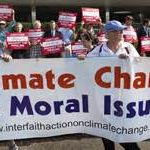COP22: The final assessment? “A disappointing result for the poorest countries”, says LDC Watch
Published on Wed, 2016-11-30 10:46
“While there was some small cause for optimism at Marrakesh, the major issues were shuffled off, either never to be seen again or put aside for further ‘negotiation’ in the future. Overall, a disappointing result”, said Azeb Girmai, LDC Watch Climate Lead. On the positive LDC Watch welcomes the Renewable Energy initiative for Sustainable Development (REEEI) which was launched on the last day of the conference. This will scale up the provision of renewable energy to Least Developed Countries, particularly helping development in rural areas. LDC Watch also welcomed moves to set up the five-year rolling work plan of the executive committee of the Warsaw International Mechanism on how to calculate the loss and damage caused by climate change; the extension of the Lima Action Plan on gender until 2020; and the establishment of a technological framework to link up technology and finance. Lack of progress in three key areas Despite these positive moves, Marrakesh failed to make progress in three key areas: Ratifying the Second Amendment to the Kyoto Protocol; reaching agreement on how the Adaptation Fund will operate; and accepting the urgent need for more climate finance. LDC Watch is urging governments to take the following measures immediately:
The LDC Fund (established to help LDCs adapt to climate change, and specifically for their National Adaptation Programmes of Action) is massively under-resourced, as a number of NAPAs are ready to go ahead but need funding. The current Chair of the LDC Group, Tosi Mpanu-Mpanu from DR Congo recently commented about the need to provide public/state rather than rely on private funding and underscored the urgent need for developed countries to enhance their pre-2020 ambition. LDC Watch stresses the importance of adaptation in climate finance, with more finance needed for the Adaptation Fund for developing countries. While the Paris Agreement noted the need for adaptation funds, Marrakesh failed to discuss this. While $81 million has been raised for adaptation, this is miniscule to the amount of public finance required. Just before COP22 opened the Adaptation Gap Report reported that by 2030 adaptation costs would reach $140-300 billion annually, with the potential to be five times greater by 2050, so there is nowhere near enough finance to support countries’ activities. “Only if countries take action on these issues can developing countries hope to have any chance of survival”, said Gauri Pradhan, LDC Watch International Coordinator. Source: LDC News Service. Tags: |


